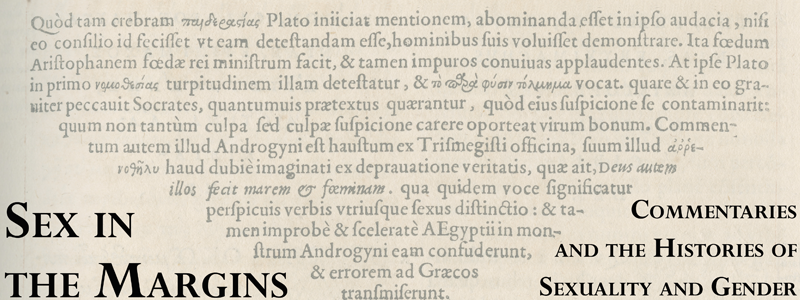About the Conference
October 10-12, 2014
UC Davis Humanities Institute (126 Voorhies Hall)
Just as commentary is hospitable to both mainstream and esoteric hermeneutic practices, so commentary can host, and disseminate, views that are both utterly conventional and radical. Our conference will explore this aspect of commentary, and in particular the intersection of interpretive traditions and the histories of sexuality and gender. Talks will focus on commentary as a particular and even privileged space for discussions of sexuality and gender.
Commentary, speaking very generally, is a mode that arises when a culture prizes (for a variety of reasons) texts of an earlier cultural formation and must explicate them to contemporaries. In the case of the western tradition of commentary on “classical” (i.e., pre-Christian Greek and Latin) texts, works that had high status for certain sectors of the society confronted readers and scholars with sexual practices and attitudes that were foreign, in some cases repugnant to later expectations about sexual roles and acts. What makes the commentary – whether marginal, interlinear, or lemmatic – a special instance within reception is that by its very logic it must confront the ipsissima verba of the original author (or at times establish what those verba might have been). In this regard, it is most similar to translation. Of course, commentary can duck the challenge, just as a translation can omit offensive passages, but this is itself worth noting. The expectation, however, that the commentator will do his/her duty to explicate a text creates a library of productive negotiations that merit study. Some may adopt a censorious tone, offering “moral” in addition to philological instruction. How do the two interact? How does prejudice impact scholarship and when does philological rigor trump prejudice? In other instances, specifics in the classical text may offer a scholar of a later period an opportunity to speak about nefanda, license in other words to examine and discuss topics that would otherwise be taboo. In such cases, one might see the space of the margin (whether literal or figurative) as liberatory. Moreover, commentaries themselves have their own reception histories whose contribution to the histories of sexuality and gender have hardly been addressed.
The conference, it need hardly be said, will not be exhaustive, but it will present a broad set of examples in the commentary traditions of many different Greco-Roman authors, with commentaries in Greek, Latin and vernaculars, from late antiquity to the present day. We will also have papers addressing similar (or very different) negotiations in commentary on legal texts, and within the commentary traditions in Hebrew, Japanese, and Chinese. We hope that the conference as a whole will contribute to a broader appreciation of the ways the histories of reception, sexuality and gender are mutually imbricated in numerous contexts.
Banner image credit: H. Estienne and J. de Serres, Platonis opera quae extant omnia vol. 3 (p. 171), Geneva 1578. Special Collections, University of California Library, Davis
